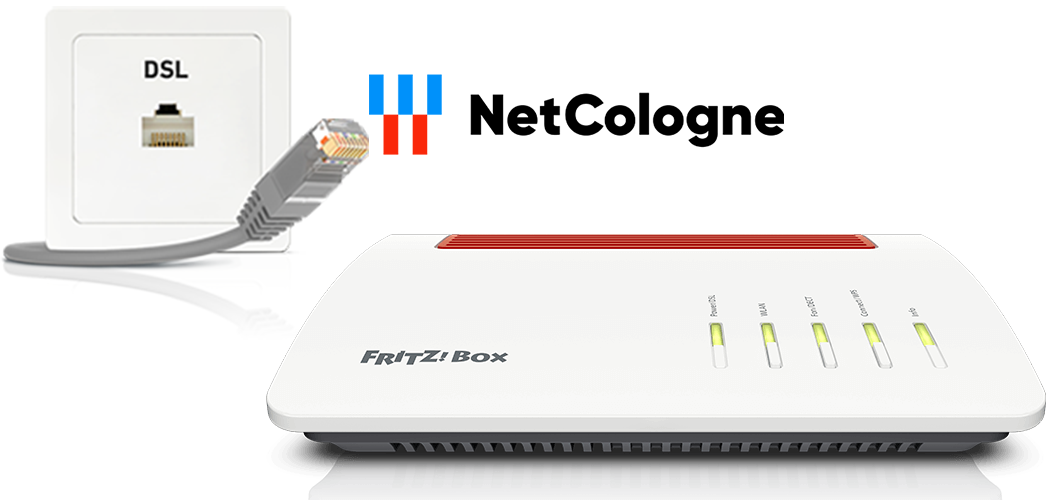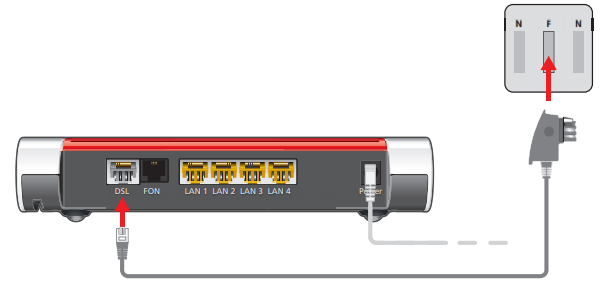Knowledge Base
AVM Content
Setting up FRITZ!Box for use with a DSL line from NetCologne

The FRITZ!Box is optimally prepared for use with a DSL line from NetCologne. Simply connect the FRITZ!Box to the DSL line and enter your personal account information in the FRITZ!Box user interface. If NetCologne provided you with the FRITZ!Box, it will be configured automatically.
The complete FRITZ!Box range of functions for internet, telephony, and television (NetTV) is then available to all of the devices in your home network without restriction.
Note:All instructions on configuration and settings given in this guide refer to the latest FRITZ!OS for the FRITZ!Box.
1 Having your account information ready
- Have your personal account information for internet access and the login information for telephony that you received from NetCologne ready.
Note:You can find the account information in the confirmation of your order from NetCologne and at einstellungen.netcologne.de. If you do not have any account information, contact NetCologne.
2 Connecting the FRITZ!Box with your DSL line
3 Activating the FRITZ!Box
- Log into the NetCologne OnlineService with your customer number and customer password.
- Click "Produkte", then "Produkt bearbeiten", and then "Weiter".
- On the page "Optionen", click "Weiter".
- Select the option in "Ich werde mein eigenes Endgerät nutzen".
- Click "Weiter" and follow the instructions.
4 Configuring the internet connection in the FRITZ!Box
- Open the FRITZ!Box user interface.
- Enter the FRITZ!Box password given on the type label of the FRITZ!Box and click "Log In".
- If the wizard for internet access does not start automatically, click "Wizards" and then "Configure the Internet Connection".

Calling up the FRITZ!Box wizard - Select "more internet service providers" from the drop-down list.
- Select "NetCologne / NetAachen" from the second drop-down list.
- Select the entry that corresponds to your NetCologne line and click "Next".
- Enter the account information you received from NetCologne in the fields.
- Click "Next" and follow the wizard's instructions.
- Now the FRITZ!Box checks whether an internet connection can be established with the account information you entered. Configuration is complete as soon as the message "The internet connection check was successful" is displayed.
Important:If the internet connection check fails, your internet access may not have been activated yet. In this case, contact NetCologne.
5 Setting up telephony in the FRITZ!Box
Configuring telephone numbers
- Click "Telephony" in the FRITZ!Box user interface.
- Click "Telephone Numbers" in the "Telephony" menu.
- Click the "New Telephone Number" button.
- If shown, enable the option "Internet telephone number" and click "Next".
- Select "Other provider" from the drop-down list.
- Enter the login information supplied by NetCologne in the corresponding fields.
- Click "Next" and follow the wizard's instructions.
Assigning telephone numbers
- Click "Telephony" in the FRITZ!Box user interface.
- Click "Telephony Devices" in the "Telephony" menu.
- Click the
 (Edit) button for the respective telephony device.
(Edit) button for the respective telephony device. Important:If the telephony device was not configured yet, click the "Configure New Device" button and follow the wizard's instructions.
- From the drop-down list "Outgoing Calls", select the number to be used by the telephony device for making outgoing calls. If you do not select a telephone number, the number entered under "Telephony > Telephone Numbers > Line Settings" is used for making calls.
- Select the telephone numbers to which the telephony device should react when you receive calls. You can select up to ten numbers (including the number for outgoing calls).
- Click "Apply" to save the settings.
